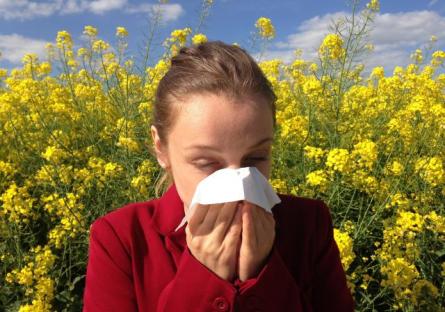This article appears for archival purposes. Any events, programs and/or initiatives mentioned may no longer be applicable.

Wellness Wednesday: Attack of the Allergens
As the seasons change old plants wither as new plants bloom, pollen travels through the air, and animals migrate to new stomping grounds or return home. With this new cycle of nature comes allergens—this article by the American Academy of Allergy Asthma and Immunology breaks down what allergens are. Just as flowers bloom and grasses grow so too will eyes itch, heads ache, and noses sneeze.
Knowing that these seasonal allergies are coming gives us time to prepare and practice preventative measures to minimize our discomfort once they hit.
Know Your “Enemy”
As Sun Tzu once said: "If you know the enemy and know yourself, you need not fear the result of a hundred battles." Understanding what seasonal allergies are in general and understanding specifically what plants trigger YOUR symptoms will help get you through this congested moment in time. Penn Medicine has put together this informative video on the facts about allergies and also debunks a few common misconceptions about them.
Three Ways to Protect Yourself From Allergens and Treat Your Symptoms
Quality Air Filtration: Keeping your indoor air clean is a great way to cut down on your exposure to allergens. Close your windows and use the A/C in your house and car. Regularly change your air filters.
Over-the-counter remedies: If you're experiencing allergy symptoms, there are oral antihistamines, decongestants, and nasal sprays that may help relieve your discomfort. There are also combination medications that combine antihistamines with a decongestant that can help when you're feeling under the weather. Check with your doctor or pharmacist before starting any new medication. Some allergy medications could cause drowsiness or react poorly with other types of medication.
Rinse your sinuses: It can feel weird at first but one of the best things you can do to relieve nasal congestion is to flush out your sinuses with a saline solution. You can get a neti pot or squeeze bottle at a pharmacy or health food store. If you use a neti pot, fill the container with water that is distilled, sterile, previously boiled and cooled, or filtered using a filter with an absolute pore size of 1 micron or smaller. The rinse should directly flush out any mucus and allergens in your nose, offering immediate relief. Just be sure to rinse out the irrigation device after each use with similarly distilled/sterile water and leave it open to air-dry.
For more information on how to treat your allergy symptoms check out Mayo Clinic’s Seasonal Allergies: Nip Them In The Bud.
How Do I Know It’s Just My Allergies Acting Up?
One of the trickier aspects to navigate during allergy season is that the symptoms allergens trigger are often similar to those of a cold, flu, or even COVID-19. The Beaumont Health System has put together this very useful chart of symptoms that can help you figure out why you’re feeling sick. Wearing a mask and practicing safe social distancing is a strong preventative measure if you’re feeling any of these symptoms. If the symptoms worsen or don’t abate after a few days, it would be prudent to see a medical health professional.
Forecast Your Allergies
The folks at WebMD have put a free handy phone app that provides a daily, personalized allergy and weather forecast. WebMD Allergy is available for iOS and Android. You can also find pollen counts on the American Academy of Allergy Asthma & Immunology website’s National Allergy Bureau.